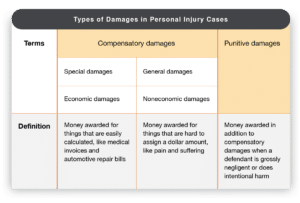Updated October 22, 2024
Special Damages vs. General Damages: What’s the Difference?
In a personal injury case, special damages are awarded for economic losses such as medical bills. If you have been injured in an accident that was not your fault, contact the experienced Indianapolis attorneys at Wilson Kehoe Winingham to find out what your claim might be worth. Call 317-218-9643.
It’s no secret that legal terminology can be confusing. But if you were injured or your property was damaged due to someone else’s carelessness, you may need to learn some legal lingo.

In this article, we’ll discuss the difference between special damages and general damages.
First, what are damages?
- In tort law, a defendant has allegedly committed a tort, an act that caused harm to someone.
- Harm may be a physical injury, property damage, damage to your reputation, or the loss of the enjoyment of a legal right.
- The plaintiff files an insurance claim or lawsuit to recover damages—monetary compensation for harm suffered because of the defendant’s deliberate act or negligence.
Types of Damages
This article focuses on personal injury cases, a subset of tort cases.
If you’re considering filing a personal injury claim, it’s good to be aware of the various types of damages that are available so you know what to expect when seeking compensation.
All types of damages involve money awarded to a plaintiff (the person making a claim) through an insurance settlement or a judge or jury’s decision.
The first big distinction to make is the difference between compensatory and punitive damages:
- Compensatory damages compensate the plaintiff for direct expenses or less tangible harm resulting from the defendant’s negligence.
- Punitive damages punish the defendant for fraud, a deliberate act that caused harm, or gross negligence.
The next distinction to be aware of is between the two types of compensatory damages and the two terms for each type:
- Special damages or economic damages
- General damages or noneconomic damages

What Are Special Damages?
Special damages are compensation for expenses you incur due to an injury caused by someone else’s negligence. Because special damages reimburse you for specific expenses, they are also called economic damages.
Special Damages Examples
Suppose someone runs a red light in front of you and causes a car accident. You are injured in the accident, and your new car is destroyed. An ambulance takes you to the nearest hospital, where you’re treated for your injury in the emergency room.
In this case, because the other driver caused the accident, you would most likely be eligible to collect compensatory damages—both special damages and general damages.
The special damages would include any expenses you have related to the accident and your injury:
Medical expenses
- The cost of the ambulance ride
- The bill from the emergency room
- The bill from the emergency room doctor
Property damage expenses
- The cost of having your car towed away from the accident site
- The cost of replacing your totaled car
In general, you can claim any expense linked to property damage or an injury resulting from someone else’s negligence as special damages. Types of special damages in tort cases include:
Injury-related damages
- The cost of treating your injury
- Rehab or physical therapy costs
- Payment for lost wages if your injury keeps you from working
- The cost of everyday household assistance necessitated by your injury
Property-related damages
- Reimbursement for repairs to your damaged property
- The cost of replacing property that can’t be repaired
- The cost of a rental car while your damaged car is in the shop
- Reimbursement for one-of-a-kind items damaged or destroyed in an accident
How to Calculate Special Damages
Special damages are known as economic damages because precise dollar amounts are associated with each item. Often, these dollar amounts are on invoices and receipts, whether they’re on paper or in digital form.
- Past medical expenses are calculated by adding up your previous doctor’s bills.
- Future medical expenses are calculated based on the course of treatment prescribed by your doctor.
- Lost wages are calculated based on your regular hourly or weekly pay rate multiplied by the time you’ve missed from work.
- Car values can be determined by consulting resources like the Kelley Blue Book.
- To calculate a dollar value for other types of property damage, it may help to refer to past awards in similar accidents.
Suppose you slip and fall at a grocery store and sprain your wrist. Your medical treatment costs $8,000. In addition, you also missed two days of work when you were unable to use your computer. If you earn $500 a day, you have lost wages totaling $1,000. Therefore, you could claim $9,000 in special damages.
Special damages for future medical care and future lost wages can be more complicated to calculate. In some cases, your personal injury lawyer may call on an expert witness to testify in support of a claim for future expenses.
Call us at (317) 689-0654 for your free consultation.
What Are General Damages?
General damages are compensation for losses that don’t have a specific price tag but still come from an injury caused by someone else’s negligence. General damages compensate a plaintiff for intangible things—things that are truly felt but invisible and highly subjective.
Because general damages compensate you for intangible things, they are also called noneconomic damages.
General Damages Examples
General damages can be awarded for a wide range of things. Types of general damages in tort cases often include:
- Physical pain
- Disfigurement (e.g., permanent scarring or loss of a limb)
- Physical impairment or disability (e.g., no longer able to walk)
- Emotional distress (e.g., anguish from the loss of a loved one)
- Mental health problems [e.g., post-traumatic stress disorder (PTSD)]
- Loss of consortium (i.e., loss of the benefits of the marriage relationship)
- Reduced quality of life
- Future pain and suffering
How to Calculate General Damages
General damages are much harder to calculate than special damages:
- They’re intangible.
- They have no associated invoices or receipts.
- They’re subjective—that is, they’re based on how the plaintiff feels.
Consequently, expert witnesses often play an important role in determining whether general damages should be awarded and what dollar amount should be given.
- An expert medical witness might testify on disability or loss of physical functions.
- A pain management expert might testify on a plaintiff’s physical pain.
- A psychologist or psychiatrist might testify on emotional distress, anguish, or mental illness.
Because a judge or jury has to make a subjective decision about general damages, the plaintiff’s likability, the demeanor of the plaintiff’s lawyer, and the credibility of the expert witnesses are some of the intangible factors that can affect a case’s outcome. An experienced personal injury attorney is aware of these factors and manages them so you can receive the compensation you deserve.
Claiming Damages
Whether or not a defendant could have anticipated the injuries caused by an accident makes no difference to a plaintiff’s damage claims. Even if the result of an accident is very unusual, a plaintiff still has a right to seek compensation from the responsible party.
For example, suppose Driver 1 causes a minor car accident. Driver 2 has a rare condition that is aggravated by the accident, requiring extensive treatment and inflicting significant physical pain. Driver 1 can be held responsible for both special damages (specific medical bills) and general damages claimed by Driver 2 (compensation for pain and suffering)—even though a driver without the rare condition probably wouldn’t have been injured as a result of the accident.
Contact a Personal Injury Attorney Today
If you or a loved one were injured as a result of someone else’s negligence, the experienced Indianapolis personal injury lawyers at Wilson Kehoe Winingham can help you seek compensation to ease your financial burden as you recover.
Fill out our online contact form for a free, no-obligation case evaluation.
Contact Us
Let WKW put our experience to work for you. Contact us for your free case evaluation.
Or, call us today at (317) 920-6400


